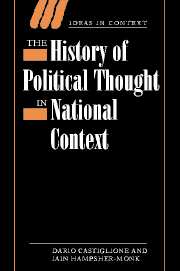Book contents
- Frontmatter
- Contents
- List of contributors
- Preface
- 1 Introduction The history of political thought and the national discourses of politics
- 2 The voice of the ‘Greeks’ in the conversation of mankind
- 3 History of political theory in the Federal Republic of Germany: strange death and slow recovery
- 4 A German version of the ‘linguistic turn’: Reinhart Koselleck and the history of political and social concepts (Begriffsgeschichte)
- 5 One hundred years of the history of political thought in Italy
- 6 Discordant voices: American histories of political thought
- 7 The professoriate of political thought in England since 1914: a tale of three chairs
- 8 The history of political thought and the political history of thought
- 9 The rise of, challenge to and prospects for a Collingwoodian approach to the history of political thought
- 10 Towards a philosophical history of the political
- 11 ‘Le retour des émigrés’? The study of the history of political ideas in contemporary France
- 12 National political cultures and regime changes in Eastern and Central Europe
- 13 The limits of the national paradigm in the study of political thought: the case of Karl Popper and Central European cosmopolitanism
- 14 Postscript. Disciplines, canons and publics: the history of ‘the history of political thought’ in comparative perspective
- Index
- IDEAS IN CONTEXT
8 - The history of political thought and the political history of thought
Published online by Cambridge University Press: 23 September 2009
- Frontmatter
- Contents
- List of contributors
- Preface
- 1 Introduction The history of political thought and the national discourses of politics
- 2 The voice of the ‘Greeks’ in the conversation of mankind
- 3 History of political theory in the Federal Republic of Germany: strange death and slow recovery
- 4 A German version of the ‘linguistic turn’: Reinhart Koselleck and the history of political and social concepts (Begriffsgeschichte)
- 5 One hundred years of the history of political thought in Italy
- 6 Discordant voices: American histories of political thought
- 7 The professoriate of political thought in England since 1914: a tale of three chairs
- 8 The history of political thought and the political history of thought
- 9 The rise of, challenge to and prospects for a Collingwoodian approach to the history of political thought
- 10 Towards a philosophical history of the political
- 11 ‘Le retour des émigrés’? The study of the history of political ideas in contemporary France
- 12 National political cultures and regime changes in Eastern and Central Europe
- 13 The limits of the national paradigm in the study of political thought: the case of Karl Popper and Central European cosmopolitanism
- 14 Postscript. Disciplines, canons and publics: the history of ‘the history of political thought’ in comparative perspective
- Index
- IDEAS IN CONTEXT
Summary
This chapter is partly exegetical, partly analytical and partly critical. The exegetical part is in fulfilment of one of the aims of the collection which is to bring together what has been going on in the history of political thought in various national contexts over the past twenty or thirty years. It will start by presenting a terse reading of the two most influential methodologists (and practitioners) of the history of political theory in the English language, sharpening their differences whilst acknowledging their common aims. The analytical points are twofold – first to identify their illocutionary force by locating them in the context of those conventional, academic speech acts from which they might be seen to be departing, and second to draw out the implications of such a departure. The critical phase is concerned to confront the tensions which the author sees existing between the successful methodological revolution and recent practice in the field. First then, I will rehearse, briefly, a story the outlines of which will be well known to many readers.
In 1962 John Pocock published an essay entitled ‘The History of Political Thought: a Methodological Enquiry’. In 1968 John Dunn published ‘The Identity of the History of Ideas’ and the following year Quentin Skinner published ‘Meaning and Understanding in the History of Ideas’.
The thrust of these three foundational works, taken together was clear. Invoking the key words of each title, what was being asserted was that the identity of political theory was historical, that the appropriate method to be deployed in its study was a historical one, and that the meaning to be derived from political theory texts which vindicated any claim to have understood them had to be, or be shown to be departing from, a historically identifiable meaning.
- Type
- Chapter
- Information
- The History of Political Thought in National Context , pp. 159 - 174Publisher: Cambridge University PressPrint publication year: 2001
- 6
- Cited by



